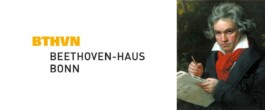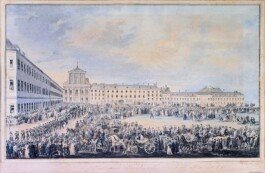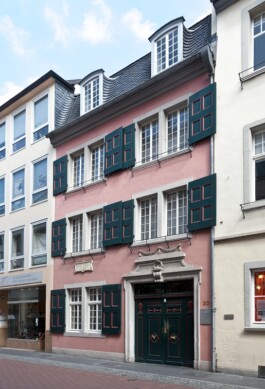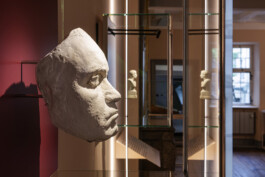


December 16, 2022
Each week, discover one of the members of the Network of Houses and Museums of European Musicians. These places link the past, present and future, they honor a tangible and intangible heritage and fulfill an essential cultural purpose in Europe. This week, we bring you to Bonn (Germany) to discover Beethoven's birthplace (Beethoven Haus), today a museum and cultural centre with a European aura.

Ludwig Van Beethoven (1770-1827) was a virtuoso pianist, a genius composer and a great European. In a more global sense, this Bonn-born genius left his mark on the history of music and on history itself. As a young prodigy, he became a pupil of the great teacher Neefe and, thanks to Count Waldstein, Beethoven then left to study for two years (1792-1794) in Vienna with the greatest master of the time, Joseph Haydn. This was followed by a career as a virtuoso pianist in the greatest salons of the time, the first signs of deafness from the age of 26 (he became completely deaf at the age of 50). It was in the latter part of his life that he composed his most mythical works. Beethoven's funeral took place in Vienna on 29 March 1827 and half of the city's population attended (photo below).

His legacy of sonatas, symphonies and quartets is both invaluable and timeless. Among his best-known works is the 5th Symphony, including the famous first movement.
Ludwig van Beethoven, Symphony No. 5, 1st movement with Insula orchestra Akademie für Alte Musik Berlin.
Alfred Brendel (member of the CEM Honorary Committee) plays the Piano Sonata No. 14 in C sharp minor op. 27 No. 2 "Moonlight" composed by Beethoven in 1801.
Leon Feischer (member of the CEM Honorary Committee) / George Szell, The Cleveland Orchestra.
The finale of the Ninth Symphony, with the theme "Ode to Joy", is originally a poem by Friedrich von Schiller written in 1785 and composed in 1823 by Beethoven. Beethoven was a follower of the democratic ideals of the Enlightenment and an admirer of the French Revolution. This poem celebrates the ideal of human unity and brotherhood and became the European anthem in 1972 (officially in 1985). An anthem that "symbolises not only the European Union, but also Europe in the broadest sense".
Jaewon Kim & Eric-Maria Couturier perform the Ode to Joy at the Villa Viardot in Bougival on Europe Day, 9 May 2018.
In 2020, on the occasion of the 250th anniversary of the German composer's birth, the Jacques Delors Institute and the Calouste Gulbenkian Foundation are organising a symposium to explore how Beethoven is a symbol and catalyst of European unity, beyond his "Ode to Joy". A conference bringing together Bernard Fournier, musicologist and specialist in Beethoven's work, Jorge Chaminé, baritone, founding president of the Centre Européen de Musique and member of the Board of Europe Nostra, and Rui Vieira Nery, musicologist, former Secretary of State for Culture (Portugal) and director of the "Programa Gulbenkian Culture".
A memorial site, museum and cultural center, the Beethoven Haus in Bonn was founded in 1889 by the Beethoven House Association. The mission of this high place is to highlight the life and work of this immense figure in the history of European music.

The front of Beethoven's birthplace in Bonn.
The Beethoven-Haus houses the most important collection dedicated to Beethoven in the world. The museum in Beethoven's birthplace attracts more than 100,000 visitors each year. Its permanent exhibition contains around 150 items including portraits, manuscripts, scores, musical instruments and everyday objects from the period which explain Beethoven's life and work.

The Beethoven Museum in Bonn houses the largest collection of objects, works and memorabilia related to the great musician.
The Beethoven Haus also houses a musicology research department with its own library and publishing house, as well as a chamber music room named after Hermann J. Abs. It is in the latter that numerous events are organised throughout the year. Thanks to the commitment and support of some 900 friends, patrons and members of more than 20 nationalities, as well as the German government, the state of North Rhine-Westphalia and the city of Bonn, the association carries out various cultural tasks of national and international significance.
More information: www.beethoven.de


Playlist



